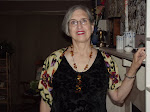I belong to a women’s spirituality group that meets for
an hour on Sunday mornings via Zoom. The group, Changing Women, which started
at First Unitarian Universalist Church of Houston, has been meeting for at
least three decades. I used to be involved all those years ago when we were
members at First Church, but when we changed congregations to get closer to
home, I stopped going.
COVID has had more deleterious effects than anything I can
remember in my lifetime. Oddly enough, it did have one positive effect, at
least for me. Several of my organizations started using online meetings during lockdown
and continued the practice afterwards. Changing Women is one of those
organizations.
A momentary detour into geography may be helpful because
Houston is so much bigger than most people who are not from here can imagine. The
Houston MSA (Metropolitan Statistical Area) contains nine counties, Harris
County being the central entity. We live on the far western outskirts of Harris
County in a community called Cypress. Down the road a few miles is Waller
County, and up the street a few miles is Montgomery County. Our part of Cypress
is in a corner that butts up against these other two counties.
The cultural heart of Houston is the Theatre District
downtown, followed by the Museum District in mid-town. Those locations are
about 30 miles from us. Driving to the far end of Harris County from our house,
Seabrook, is over 60 miles. First Church is in the Museum District, so the amazing
opportunity to meet online versus driving brought me back to Changing Women a
few years ago.
The group is centered around the book Earth Medicine: Ancestor Ways of Harmony forMany Moons by Jamie Sams. Published in 1994, it is a collection of daily
readings based on Native American spirituality, tied to the cycle of the moon.
There are two companion books to Earth Medicine:
Medicine Cards and Sacred Path Cards.
As the name implies, each book comes with a set of cards,
similar in size and shape to tarot cards, meant to be used with guidance from
their companion books. Medicine Cards
is about how animal totems can enlighten you; Sacred Path Cards delve into Native
American beliefs about spiritual development and how people should live.
The reading for September 28 was Boredom. It told a story
of one child who used time creatively and another child who felt aimless and
bored. There were three questions suggested in the study guide for the reading.
How are you creating beauty from what you have at hand? What are you seeing in your mind’s eye? How does boredom affect creativity?
My initial reaction was kind of combative. I never feel bored. I
mean, duh, books, right? Then a bit of reality slipped by my defenses. Uh, reels
on Facebook? Email? Mindless games on my phone? Even when I read a “good” book
(as opposed to pulp fiction), am it just masking boredom?
This is a poser, for sure, but I have so far concluded
that passing time is not creativity. Even making something isn’t necessarily creativity.
I think I have been conflating creativity with activity. Shame on me for
feeling so smug about my own cleverness!
So what does constitute creativity? Two days is not
enough time to devote to this question, but some things did pop up readily.
Creativity requires the application of thoughtfulness and design to a problem
or idea. Take making a quilt. What do I want my quilt to look like? What
fabrics can I use to achieve the effect I want? How should I cut those fabrics
and sew them back together to realize the image that’s in my brain?
Even if I use someone else’s pattern for a quilt, there
are countless intermediate steps, starting with picking the fabric and ending
with how to finish the binding, that require creative processes. I have made two quilts for which the pattern
and all the fabrics were pre-selected. I made them in Block-of-the-Month classes
designed to teach technique and coach people through difficult quilt block execution.
But at the end of these admittedly non-original, non-creative processes, I had to
make a creative choice about how to finish the quilts.
Option one, pay someone to quilt it on a machine. That’s
minimally creative, assuming I pick the pattern. Option two, machine quilt it
myself. More creative decisions required here. Option three, hand quilt it,
which then requires several more choices about pattern, thread, and complexity.
I hand quilted one of my non-original quilts with a
fairly simple overall pattern because I had a time crunch. It turned out
beautifully, BTW, and the recipient really appreciated it. I’m still working on
the second one, years after I finished the top, because I picked a ridiculously
complicated quilting design to hand quilt. It will be done one of these years
and that’s okay.
Most of the quilts I make now days are unique wall hangings,
designed and executed by me, to express something special. Often, they are
designed for particular people. Alix, for example, has a small reverse appliqué
of a tree frog that I made for her because she loves frogs. I designed and made
a reverse appliqué wall hanging of a monarch butterfly for myself.
Musing about boredom and creativity has led me to realize
that I am spending precious time on activities with little or no value instead
of activities that are fulfilling and expressive. And I’m really too old to be
wasting my time like that. How about you?
Ciao






No comments:
Post a Comment